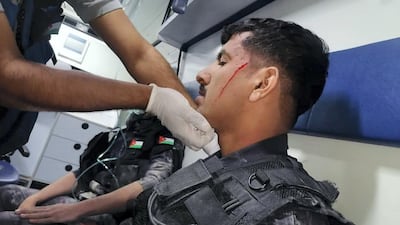Shots were fired into the air near Amman as security forces fought with rioters supporting an MP removed from Parliament on Sunday for comments deemed insulting to Jordan's King Abdullah II, witnesses told The National.
Hundreds of Osama Al Ajarmeh's supporters have been gathering in the Naour suburb of the Jordanian capital since Saturday, when four police officers were wounded in clashes.
"Security forces are dealing with riot acts and bullets being fired in the air in Naour. Anyone trying to reach the assembly point is being arrested," state newspaper Al Dustour reported.
The violence indicated simmering clan and tribal tensions in the country where unemployment and poverty are high.
Jordan has been in recession since last year, and unemployment is officially at a record 24 per cent.
Parliament head Abdulmunem Awadat announced on Sunday that Mr Al Ajarmeh was fired after he made disrespectful comments about the king.
Mr Al Ajarmeh said last week that he had resigned from parliament.
“What Al Ajarmeh uttered about his majesty is condemned and not accepted by parliament,” Mr Awadat told deputies in a televised parliamentary session.
The exact comments, or when they were made, were not revealed in the session convened on Sunday to dismiss Mr Al Ajarmeh.
The MP was censured for criticising Parliament last month when he demanded a debate on a nationwide electricity outage on May 22 that was not granted.
In Naour, witnesses said protesters had erected a large tent near the road to Queen Alia International Airport, a tribal gesture of support for Mr Al Ajarmeh in defiance of official orders not to gather.
Traffic to the airport was not affected, the witnesses said.
“No one can get to the tent because the police have been arresting anyone who goes near,” said a witness, who declined to be named
A video circulated by Mr Al Ajarmeh’s supporters purportedly shows a crowd in front of a villa in Naour chanting in support of Mr Al Ajarmeh while some among the crowd fired shots in the air.
Another shows an armoured police vehicle parked near a tree on the edge of Naour while the sound of gunfire is heard from the background.
Jordan’s Parliament, dominated by tribes, holds little power to make change in the kingdom, but is seen as state-sanctioned forum where some deputies can vent frustration at the government.
Most powers in the country are concentrated with King Abdullah, who has ruled since succeeding King Hussein in 1999.
Jordan’s tribes form a bedrock of support for the monarchy, dominating employment in the government and the security forces.
But their lot has taken a hit in the last decade from a stagnant economy and rising costs of living, and less hiring by the state.
Incidents of tribal violence have risen in the last 10 years in Naour and in other tribal and clan regions that depend on the state, as opposed to employment in the private sector.
A large proportion of Jordan's 10 million population are of Palestinian origin, and Jordan's monarchy, descendants of the Hashemites of Makkah, is widely seen as central to social stability.
In April, the authorities released the 16 members of tribes who were implicated in what the king described as attempted sedition.
The 16 were linked to Prince Hamzah bin Hussein, a half-brother of King Abdullah and a former crown prince.
Two other people involved in the episode, a former chief of the royal court and a junior royal, are still in detention.


